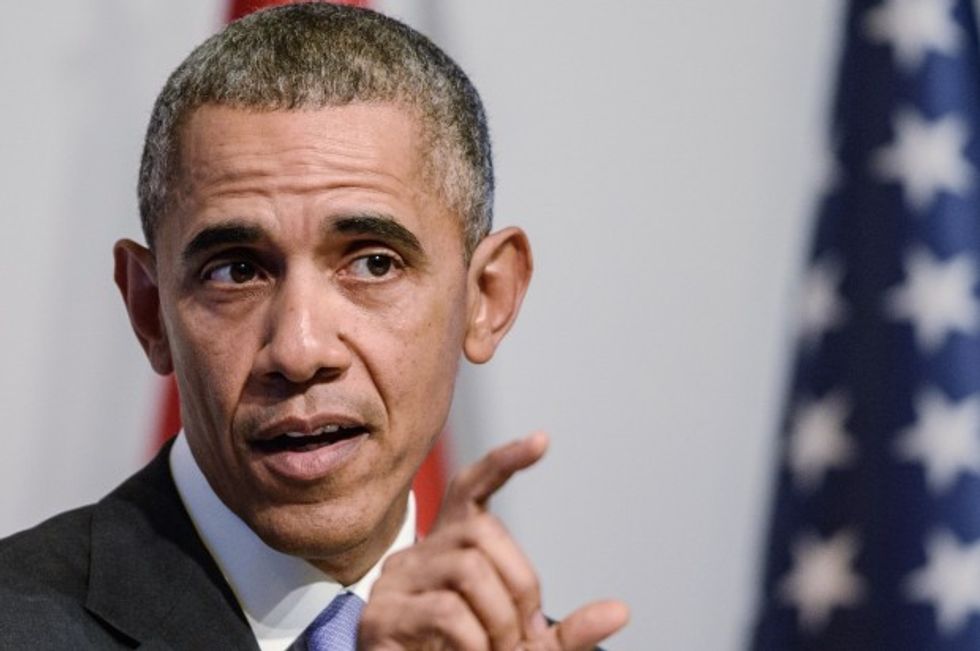The White House said in a statement Wednesday evening that President Barack Obama would veto a House bill tightening controls on Syrian refugees seeking entrance into the U.S.
 OZAN KOSE/AFP/Getty Images
OZAN KOSE/AFP/Getty Images
In a statement of administration policy, the White House said the legislation proposed by Republican lawmakers would "introduce unnecessary and impractical requirements" on individuals seeking asylum.
Here's the full statement:
The Administration's highest priority is to ensure the safety and security of the American people. That is why refugees of all nationalities, including Syrians and Iraqis, considered for admission to the United States undergo the most rigorous and thorough security screening of anyone admitted into the United States. This legislation would introduce unnecessary and impractical requirements that would unacceptably hamper our efforts to assist some of the most vulnerable people in the world, many of whom are victims of terrorism, and would undermine our partners in the Middle East and Europe in addressing the Syrian refugee crisis. The Administration therefore strongly opposes H.R. 4038.The current screening process involves multiple Federal intelligence, security, and law enforcement agencies, including the National Counterterrorism Center, the Federal Bureau of Investigation, and the Departments of Homeland Security (DHS), State, and Defense, all aimed at ensuring that those admitted do not pose a threat to our country. These safeguards include biometric (fingerprint) and biographic checks, medical screenings, and a lengthy interview by specially trained DHS officers who scrutinize the applicant's explanation of individual circumstances to assess whether the applicant meets statutory requirements to qualify as a refugee and that he or she does not present security concerns to the United States. Mindful of the particular conditions of the Syria crisis, Syrian refugees – who have had their lives uprooted by conflict and continue to live amid conditions so harsh that many set out on dangerous, often deadly, journeys seeking new places of refuge – go through additional forms of security screening, including a thorough pre-interview analysis of each individual's refugee application. Additionally, DHS interviewers receive extensive, Syria-specific training before meeting with refugee applicants. Of the 2,174 Syrian refugees admitted to the United States since September 11, 2001, not a single one has been arrested or deported on terrorism-related grounds.
The certification requirement at the core of H.R. 4038 is untenable and would provide no meaningful additional security for the American people, instead serving only to create significant delays and obstacles in the fulfillment of a vital program that satisfies both humanitarian and national security objectives. No refugee is approved for travel to the United States under the current system until the full array of required security vetting measures have been completed. Thus, the substantive result sought through this draft legislation is already embedded into the program. The Administration recognizes the importance of a strong, evolving security screening in our refugee admissions program and devotes considerable resources to continually improving the Nation's robust security screening protocols. The measures called for in this bill would divert resources from these efforts.
Given the lives at stake and the critical importance to our partners in the Middle East and Europe of American leadership in addressing the Syrian refugee crisis, if the President were presented with H.R. 4038, he would veto the bill.
The legislation being moved in the House increases security checks for Syrian refugees, including mandating each person passes an FBI background check.
Obama has gone after Republicans who desire increased security checks or flat out don't want to accept refugees. On Tuesday, speaking in the Philippines, he said some of the GOP's rhetoric was "offensive" and "contrary to American values."
—
Follow the author of this story on Twitter and Facebook:

 OZAN KOSE/AFP/Getty Images
OZAN KOSE/AFP/Getty Images






